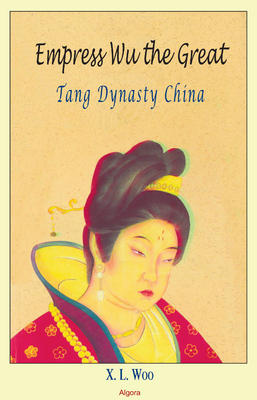
Sound Bite
Europe and Great Britain have had many sovereign queens in the course of history. In ancient China, there was none of that. Only one Empress ever ruled China in her own name ' Empress Wu. Given her startling performance in a world of deadly intrigue and shifting loyalties, Wu is still respected as an effective and clear-sighted ruler.
About the Author
X. L. Woo has published a series of narrative histories of China with Algora Publishing. Mr. Woo graduated from the prestigious Zhongshan University (Sun Yat-Sen University) in Guangzhou, China, and taught English at East China Normal University in Shanghai for more than ten years, then came to the United States on a visiting professorship at Rutgers University. A bilingual writer and poet, he has published four books in Chinese and several books in English. His essays and columns in Chinese are published in US Chinese newspapers, and one of his novels was published in a local Chinese newspaper in serial form. His translations of poems from both English into Chinese and Chinese into English have been published in magazines in China and Hong Kong.
|
|
About the Book
Empress Wu was stunning in her beauty, in her ruthless elimination of rivals (including sons and daughters), and, most important, in her discernment. Wu Zetian was esteemed for appointing capable officials throughout the realm, and she...
Empress Wu was stunning in her beauty, in her ruthless elimination of rivals (including sons and daughters), and, most important, in her discernment. Wu Zetian was esteemed for appointing capable officials throughout the realm, and she implemented reforms that improved standards of higher education, gave some status to women, and 'democratized'Â the recruitment of candidates for official posts by eliminating the requirement that they be nominated by someone within the establishment. Related in an easy-reading style, the facts in the book are derived from China's classic historical record the Zizhitongjian (meaning 'History is a mirror to help rule'Â), which was written by a courtier in Song Dynasty, the very next dynasty after the Tang Dynasty. Beginning in AD 617, the narrative traces the rise of Wu's father from humble bean-curd dealer to army officer and friend of the Emperor, her own arrival at age 13 as a concubine to the Emperor, and the brilliant exploitation of opportunities by which she attained the throne. Other empresses had ruled China for a time while their husbands were weak and their sons were young; Wu did the same from 665 to 690. But Wu achieved a higher status than any woman before or since when she declared her own dynasty in 690 and ruled directly for another 15 years. Readers are treated to some of the flavor of life inside the capital, then at Xi'an, the eastern tip of the great Silk Road (now known in international tourism as the site of the famous Terracotta Warriors). In those years the Chinese ruler held sway far to the south, into Indochina, and westward as far as today's Kyrgyzstan. Brief descriptions indicate the tumultuous events unfolding throughout Asia as China vied with Mongol tribes and the Tibetan Empire to establish the map we know today ' and some of the disputes over boundaries and sovereignty that are still ongoing.
|
Book News
Woo's fourth book in English on Chinese history tells of Empress Wu Zetian the Great (624-705), the only female sovereign to rule in her own name during all of Chinese history. He traces her career from imperial concubine to empress, empress dowager, supreme ruler, relations with other nations, and picking her successor.
(Annotation ©2009 Book News Inc. Portland, OR)
|
|
Pages 188
Year: 2008
LC Classification: DS749.42.W8W66 2008
Dewey code: 951'.017092'dc22
BISAC: HIS008000 HISTORY / Asia / China
BISAC: BIO014000 BIOGRAPHY & AUTOBIOGRAPHY / Royalty
BISAC: BIO022000 BIOGRAPHY & AUTOBIOGRAPHY / Women
Soft Cover
ISBN: 978-0-87586-660-4
Price: USD 21.95
Hard Cover
ISBN: 978-0-87586-661-1
Price: USD 29.95
eBook
ISBN: 978-0-87586-662-8
Price: USD 21.95
|













